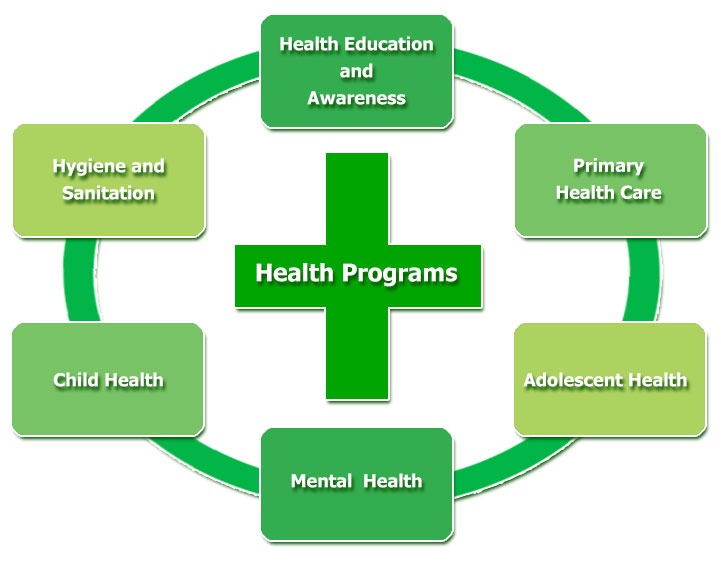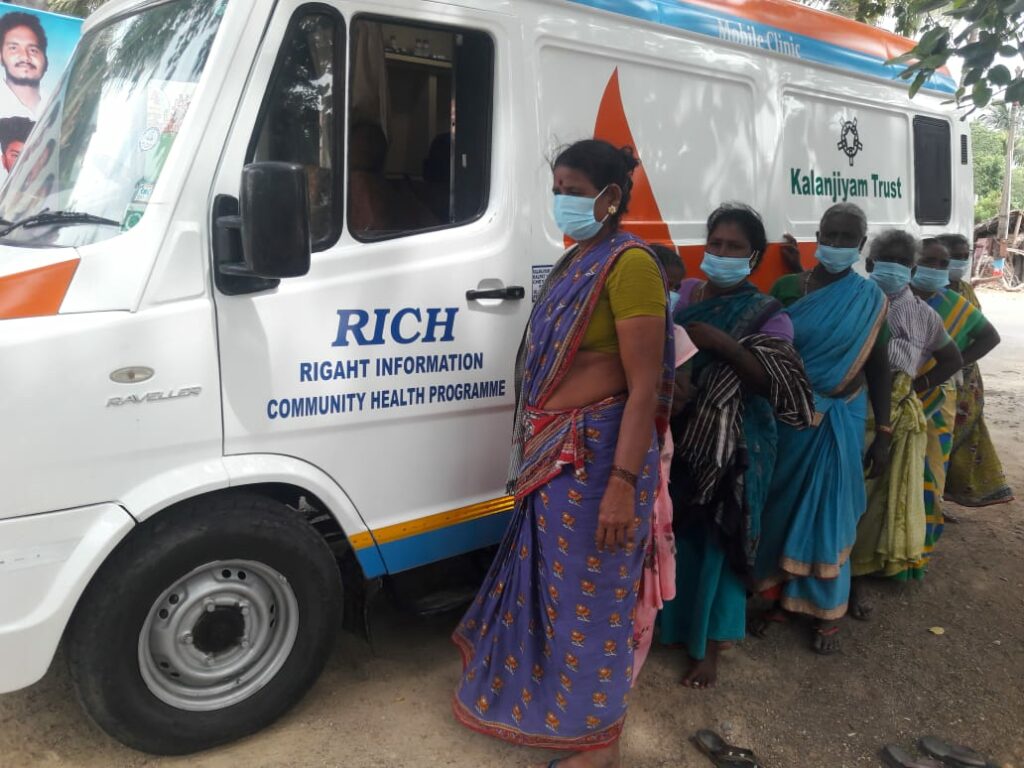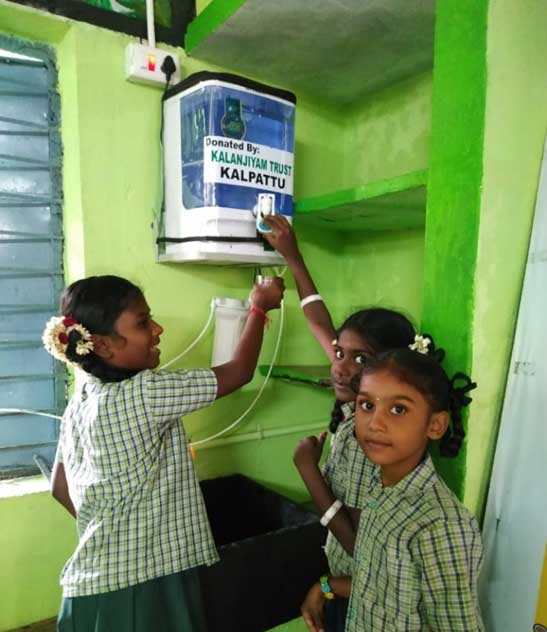Health and Hygiene
Healthcare challenges in rural India encompass individual and systemic issues. Access to healthcare is limited in remote areas, with government-run health centers often situated in small towns surrounding villages.
Kalanjiyam Community Health Programs

Kalanjiyam’s Right Information Community Health Program (RICH) program, operating in rural healthcare since 2012, is dedicated to improving the well-being of underserved populations. It focuses on delivering essential healthcare services and referrals to villagers’ doorsteps while promoting health awareness and community empowerment for preventive care. The RICH team, consisting of local nurses, para-health/outreach workers, a driver, and an assistant, tackles healthcare challenges in remote villages. Village selection involves consultations with local leaders. People of all ages, including children, men, and women, rely on the program for medical consultations, education, counseling, and medications.
The RICH program plays a crucial role in facilitating referrals for specialized treatment, addressing cases like tuberculosis, seizures, pregnancy complications, cardiac ailments, and diabetes. Outreach workers diligently follow up with referred patients to ensure treatment adherence, exemplifying Kalanjiyam’s commitment to accessible and quality healthcare for rural communities.

Outreach workers diligently follow up with referred patients to ensure treatment adherence, exemplifying Kalanjiyam’s commitment to accessible and quality healthcare for rural communities. Since its establishment in 2012, the RICH program has made a significant impact on healthcare access in rural communities. It has reached more than 200 villages in Chengalpattu and Kancheepuram districts of Tamil Nadu. Over 57,000 rural community members have benefited from free health check-ups and treatment for minor ailments, education and counseling.
Health education and community outreach programs: Health education and community outreach programs: We conduct monthly outreach programs in on issues such as TB, reproductive health, children’s health, HIV/AIDS and other issues. The aim of these activities are to increase awareness and address specific concerns among the target groups.
Ms. Anita, an outreach worker in the program, emphasizes the profound impact on adolescent girls’ lives. She notes that these girls often feel shy and lack guidance on crucial topics such as women’s reproductive health, self-care, and personal protection. Anita and her colleagues have successfully addressed these issues by providing information, addressing doubts related to menstruation, and enhancing awareness of sex and sexuality. Anita takes pride in her role, knowing that she is making a positive difference in the lives of these girls from her villages.
Ms.Tamilselvi, the nurse in the RICH program since its inception in 2012, reports “we see all types of health problems during the camps and mostly the villagers delay going to a health facility as they are ready to forego the daily wage that is their main source of livelihood. I really feel that we are doing a service that no others are doing. I also see that over the years, we have come to know the community and gained their trust’.
Adolescent Health: Addressing the health of adolescent girls, both in and out of school, is a critical priority. The RICH program tackles this challenge by conducting awareness and health camps in schools and community meetings to ensure comprehensive coverage, including non-school-going girls. In larger higher secondary schools, health camps are organized, benefiting adolescent girls aged 12 to 19. These girls receive comprehensive check-ups and receive advice and counseling on reproductive health, nutrition, and hygiene during menstruation. The program also includes sessions on personal hygiene, nutrition, and basic communicable diseases, promoting a holistic approach to adolescent girls’ well-being. The program has provided health check-up and counseling on adolescent health to 4,301 students from 27 rural schools.

Maternal and Child Health: The RICH program caters to pregnant and lactating women to provide education, counseling and basic check for during pre-natal, antenatal and post-natal period. A large majority of women in rural areas have poor level of knowledge and awareness on pre-natal, post-natal, and new-born, infant and child care, including infant feeding practices. Through the RICH program, the nurse and outreach workers provide basic check-up of vitals, guidance on problems during pregnancy or post-natal, nutrition, complications and counselling on all changes during pregnancy and care required after pregnancy. Close to 50% of the women experience some type of challenges in breastfeeding, and they found the interaction and counseling by the RICH nurse very useful and helped them overcome the problems. The program has supported 1,524 pregnant and lactating women since the inception.
‘I found breastfeeding very challenging, firstly I felt that the quantity of breast milk was not sufficient for the baby, and I had to feed in short intervals. So I had less time to focus on household chores and often needed help for this. The Kalanjiyam nurse not only advised me on the importance, but she also provided the moral support and listened my difficulties, which helped me very much.’
Child Health: The RICH program prioritizes children’s health by offering free healthcare services to students in adopted schools, emphasizing the importance of timely healthcare. Health Cards are distributed to children, granting them access to a local licensed healthcare practitioner for diagnosis and treatment of childhood illnesses at no cost. This intervention successfully encourages parents to address their children’s health concerns promptly, reducing reliance on locally obtained remedies from unqualified sources. Over time, it has led to improved health-seeking behaviors among parents and heightened awareness of managing their children’s health.
Cervical Cancer Awareness: Since 2022 the RICH program is conducting awareness and referral linkages for cervical and uterine cancer, one of the most common cancers among women in India. The RICH team of Nurses and Outreach Workers coordinate with local Public Health Center (PHC) the Village Health Nurse (VHN) on training of the team and in conducting awareness programs in all the coverage villages. Following these sessions, the women are accompanied to the PHC the check-up and investigation.

Hygiene and Sanitation Interventions: Since 2009, Kalanjiyam has been dedicated to addressing the critical issue of hygiene and sanitation facilities in schools, a significant factor contributing to girl child dropouts. The program tackles this challenge by providing and maintaining these facilities, including the placement of local sanitation workers from the villages. These workers are equipped with cleaning materials and are responsible for maintaining cleanliness, cleaning a minimum of three times a day. This initiative has yielded immediate and long-reaching benefits, with school teachers and students taking ownership of the program. Handwashing is actively promoted, and schools receive monthly supplies of materials. To further encourage good hygiene practices among children, a recognition system awards stars for positive habits. Additionally, drinking water filtration systems (RO systems) and extra water storage drums have been installed, with the Kalanjiyam team responsible for their upkeep.
